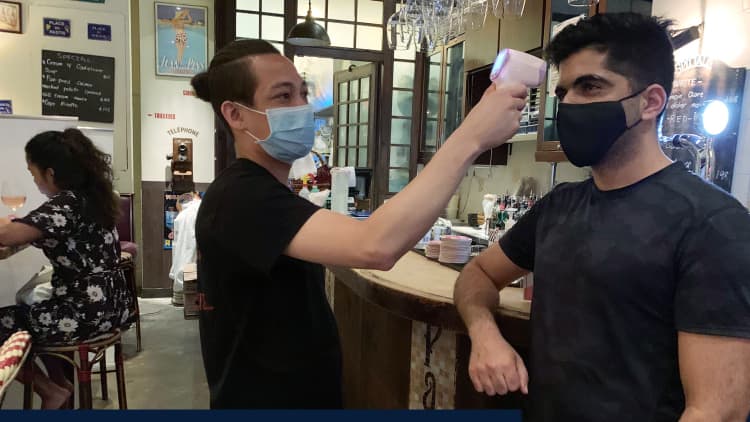
The U.N. Security Council and G-20 members need to do more as part of the international community's response to the coronavirus pandemic, former New Zealand Prime Minister Helen Clark said, calling the current blame game between nations counterproductive.
The virus outbreak was first detected in China late last year and has infected more than 3.6 million people thus far. Many countries have taken stringent measures to slow the disease's spread in communities, often at the expense of short-term economic growth.
Clark told CNBC's "Street Signs" on Wednesday that the World Health Organization (WHO) has done "quite a reasonable job" in coordinating the global health response. She was New Zealand's prime minister from 1999 to 2008.
"I've actually been rather more disappointed in two other areas: One is the Security Council's failure to agree (to) a resolution, declaring Covid-19 a threat to global peace and security," she said, referring to the disease caused by the coronavirus. "That was done in 2014 with Ebola and certainly is warranted now."
(The pandemic is) not only a health crisis causing people to die before their time was due, and many to be very ill, but it's a full-blown, full scale economic and social crisis.Helen ClarkFormer Prime Minister of New Zealand
U.N. Secretary-General Antonio Guterres earlier this month lamented the lack of global leadership in the fight against the pandemic, Reuters reported. The 15-member Security Council spent more than a month trying to negotiate a resolution highlighting the urgent need for greater international cooperation and call for a humanitarian truce in conflict areas, the news wire said. It added that diplomats said a major sticking point was how the resolution should address the WHO.
"Secondly, I think we need to see much more G-20 leadership," Clark said, pointing to the trillion-dollar pledge from the group to fund institutions like the International Monetary Fund in 2009 to help countries struggling after the global financial crisis. "We need that and more now, and we're not seeing that kind of package."
The 'counterproductive' blame game
The United States last month halted funding for the WHO and said it will review its response to the pandemic. President Donald Trump has criticized the agency, blaming it for the virus-related deaths, and implied the WHO was covering up for China.
Trump and other U.S. officials have also criticized China and suggested, without presenting evidence, the virus may have originated in a Chinese laboratory.
There is also growing international pressure for Beijing to answer questions over information it gave to the world about the infection. For its part, China has denied any wrongdoing.
Clark said the "the blame game is totally counterproductive" at the moment when international efforts should be focused on containing the pandemic. It is "not only a health crisis causing people to die before their time was due, and many to be very ill, but it's a full-blown, full-scale economic and social crisis," she said.
The International Monetary Fund last month said the world faces its worst economic downturn since the Great Depression.

While China may have been slow to inform the world about the virus, the United States and a number of other countries didn't prepare well enough before the mass outbreak reached their borders, according to Clark. Time for reviews and international inquiries would come later, once the outbreak is contained, people are back at work and the world resumes a path toward peaceful prosperity for everyone, she said.
"We can't have that while a virus rampages. Anything else is like Nero fiddling while Rome burns, frankly," she added.


